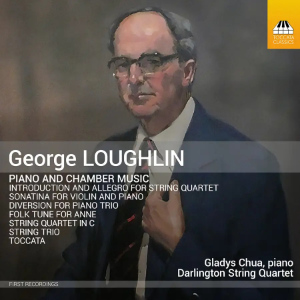
George Loughlin (1914-1984)
Piano and Chamber Music
Introduction and Allegro for string quartet (1953)
Diversion for piano trio (early 1960s)
Folk Tune for Anne (1943)
Sonatina for violin and piano (1976)
String Quartet in C (1939)
String Trio (1957)
Toccata (1964)
Gladys Chua (piano)
Darlington String Quartet
rec. 2023, Crank Studios, Perth, Australia
Toccata Classics TOCC0720 [79]
George Loughlin was born in Liverpool and attended the same school, Quarry Bank High School, as John Lennon, something that pleased him. He studied at the Royal College of Music – Arthur Benjamin for piano and Gordon Jacon for composition – later studying with Edward Bairstow. Composition had to take its place alongside teaching, as he was Director of Music at schools and later Associate Professor of Music at Toronto and then Lecturer in Glasgow. In 1957 he accepted the post of Ormond Professor of Music at Melbourne, and he remained in Australia for the remainder of his life. He died at the age of 69.
This album contains all his surviving chamber music with a single exception – the Recitative for cello and piano, which will be released at a future date. The works are tonal and approachable, some couched in the British pastoral school or else showing impressionist influence. The Introduction and Allegro for string quartet dates from his last year in Toronto (if I have the chronology right) and shows the strong influence of Vaughan Williams on Loughlin with folkloric modality and lithe, gregarious writing paramount. Tonality is more unsettled in the Diversion for piano trio written a decade or so later, with Loughlin’s use of a tone row never functioning academically but instead creatively.
The early Folk Tune for Anne is a piano piece written for his wife-to-be, in 1943. It’s full of warmth and very brief. On a larger scale is the Violin Sonatina of 1976. This is an attractive, engaging work the pithy dialogues of which add much pleasure. The second movement is an Antiphon with a complement of measured gravity followed by a Theme with four variations, varied in colour, texture and expression. The refined melancholy that’s part of the music gradually gives way to the encoded carillon of the final variation where the music lightens and brightens appreciably to end in affirmative refinement. Rather like Loughlin’s teacher Arthur Benjamin’s own Violin Sonatina, this is perhaps a rather bigger, more expressively wide-ranging work than its demure title might suggest.
Dating from 1939, the String Quartet in C is the earliest work here. Its opening movement is athletic and bustly but betrays a rather faceless quality, whilst the second movement Scherzo seems to look back to Debussy in its outer sections though it is very ripely textured and very British in its employment of a drone. Loughlin certainly knew how to spin a succulent slow movement, however, and to employ lively tunefulness in finales. The String Trio of 1957 has some bright dialogues in its opening and sounds rather unsettled in the central movement, with a strong density of tone. The exchanges are fierier in the finale where the unison challenges must be considerable. Finally, there is the Toccata for piano, a demanding work – as the title suggests – and one full of real technical challenges. Once more, there are carillon imitations, something that seems to have interested Coughlin. Gladys Chua plays it finely.
The members of the Darlington String Quartet take on the works in their various permutations and do so with some style but also awareness of textual and expressive matters.
Ther recordings were made in Crank Studios in Perth, Western Australia over three days. They’re certainly ideally clear but not ideally warm – there’s a rather dry, close-up quality that can become a little tiring.
The booklet note is written by the composer’s younger son Michael Loughlin (on the biography), Sally Boud (chamber music) and by Gladys Chua (piano music).
Altogether a good case is made for the music of this unknown, expatriate Englishman.
Jonathan Woolf
Buying this recording via a link below generates revenue for MWI, which helps the site remain free




















